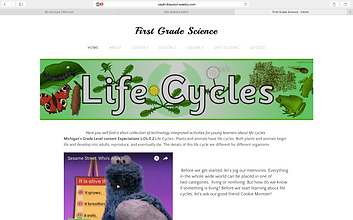Amber Lawson
EDUCATOR - INNOVATOR - MENTOR - SPARTAN
Showcase
This showcase represents the growth I have made as an educator and life long learner. I focused on a variety of key elements that helped me further my knowledge of educational strategies to reach all learners in the classroom. Four of those elements include using technology to enhance students' learning, including inquiry based learning opportunities, analyzing students' literacy assessments to drive future instruction, and how to effectively work with English Language Learners. Below you will find a variety of projects that I completed while learning about these elements.
Using Technology to Enhance Education
Technology plays a huge role in students’ education today. Through my program, I have been exposed to a variety of resources that can be used in the classroom to enhance students’ learning experiences by using screencast, graphics, and websites.
Technology Integrated Science Unit
Ideally science lessons should be engaging and hands-on. Sometimes this is difficult if a school lacks resources. With this in mind, I designed an interactive science unit for teachers to use and to guide students in using to master ideas about the life cycles of plants and animals. This website includes online games, pdf downloads, video read alouds, and optional resources to use when teaching this science standard.
Supporting Young Learners with Computers Infographic
I designed an infographic to inform others on how to support young learners with the necessary foundational skills for using computers before students are able to take assessments administered online. By having these skills, students will be able to focus on the content of the assessment instead of how to use the computer. This infographic allows readers to pick up on the information easily and efficiently than a typical essay.
Inquiry Based Learning
I learned more ways to provide students with inquiry based learning opportunities across the curriculum to allow students to bring their prior knowledge and curiosity into the classroom. By bringing their own understandings, they are able to form their own questions and answer their questions through meaningful experiences.
Things That Go: A Writing Unit
With this unit, my first grade students and I focused on the literacy skill of writing. The students had multiple opportunities to compose writing pieces as a class and individually to make a nonfiction mini unit book like one of the big book stories we read in the Open Court Reading Unit, Things That Go. Students were able to compare and contrast text and use their personal experiences to compose their writing. This pamphlet gives a detailed explanation of my experience teaching and reflecting on the unit.
Looking at Our World: A Social Studies Unit
With this unit, my students and I focused on the continents, oceans, and their world address at school. This social studies unit integrated literacy and science content as well as technology and arts and crafts. My students were fully engaged and were able to use their imaginations while learning the social studies concepts. This pamphlet gives a detailed explanation of my experience teaching and reflecting on the unit.
What's the Matter: A Science Unit
With this unit, my students and I focused on the properties and states of matter. It was a very interactive lesson that allowed students to ask questions and answer their questions through discovery. Here you will find a description of each activity and the reasoning for the instructional sequence of the activities to allow students to learn the concepts.
Analyzing Student's Literacy Assessments
I focused on a literacy concentration to help young children build a strong foundation in order to become proficient readers and writers. My classes helped me better understand students’ knowledge by analyzing literacy assessments and plan the appropriate activities necessary for students to fully develop and advance their literacy skills.
Literacy Assessments Case Study
A variety of literacy assessments were administered to two students to assess literacy skills such as phonological awareness, letter sound knowledge, spelling, frequency words, and reading comprehension. After analyzing the assessment data, I identified the areas that the students needed additional support in and provided instructional strategies to aid the students in becoming proficient readers. This case study outlines, in detail, the results of the assessments, where the students are in their understanding, and how to help the learners progress in their literacy development.
Analyzing Literacy Learners Foundational Skills
I selected one of my first grade students who needed more support in her literacy learning. Based on her performance on the Michigan Literacy Progress Profile Phonemic Awareness Assessment and the Letter Sound Knowledge Assessment, I designed a unit of one on one lessons to help her build the foundation for her literacy learning. This case study provides further explanation of my student's learning style, reasoning behind the activities chosen, and the results of the pre and post assessments.
Working with English Language Learners
I also focused on working with English Language Learners. I had an opportunity to reflect on my experiences working with ELLs and learned about more effective strategies to use in the classroom to promote student success. I observed an ELL classroom to understand how information should be presented to students and listened to an ELL teacher’s rationale.
ELL Classroom Observation and Teacher Talk
I partnered with an ELL first grade teacher. I spoke with her before and after teaching a lesson to students about the four seasons. In my prezi presentation, I included my observations, notes about my conversations with the ELL teacher, my reflection of the experience, and my ideas for a follow up lesson.
ESL Classroom Experience Reflection
During my first year of teaching, I had an ELL student in my kindergarten class. Through a narrative sketch, I was able to reflect on my experience working with this student and decided what strategies I used that was beneficial to his language skills as well as content knowledge.








